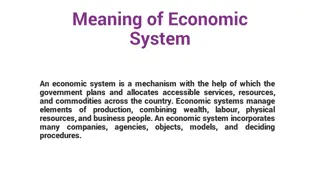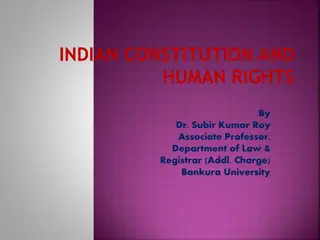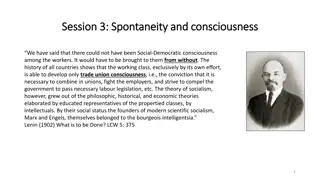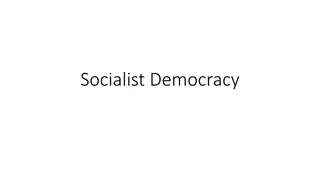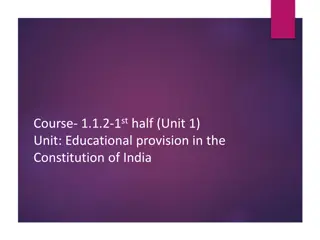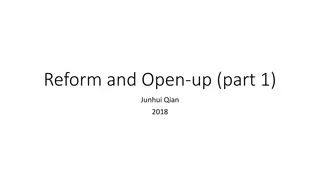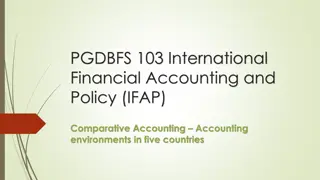Understanding Concepts of National Income in Economics
Explore the concepts of national income presented by Dr. Rashmi Pandey, covering key indicators such as Gross National Product (GNP), Gross Domestic Product (GDP), Net National Product (NNP), Net Domestic Product (NDP), Personal Income, Disposable Income, Per Capita Income, and Real Income. Gain ins
0 views • 22 slides
Understanding Economic Systems and Sectors
An economic system is a mechanism through which the government plans and allocates resources and services. Types include capitalist, socialist, and mixed economies, each with distinct characteristics. The central problem of the economy is managing scarcity. The economic sector comprises the primary,
2 views • 5 slides
Exploring Responsibility and Social Change in 'Young and Old' Play
In the play "Young and Old," the characters Eric, Sheila, and Gerald represent the younger generation, while Arthur and Sybil symbolize the older generation. The story delves into the concept of responsibility, highlighting the different attitudes towards Eva's death. Arthur and Sybil, despite being
0 views • 9 slides
Strengthening National Evaluation Capacity in the Era of Sustainable Development Goals
The presentation by Vijayalakshmi Vadivelu at the National Evaluation Capacities Conference 2017 in Istanbul focused on the importance of strengthening national evaluation capacity in alignment with the Sustainable Development Goals (SDGs). The content covers the holistic approach to national evalua
3 views • 18 slides
George Bernard Shaw: Influential Playwright and Social Critic
George Bernard Shaw, an Irish playwright, social critic, and political activist, is renowned for his witty language and social criticism in works like "Arms and the Man," "Pygmalion," and "Saint Joan." Shaw's influence on British socialist theory through Fabianism and his embodiment of realism in En
0 views • 25 slides
Indian Constitution and Human Rights: A Comprehensive Overview
The Indian constitution embodies justice in social, economic, and political spheres, aiming for the full development of every individual. Rooted in democratic principles and socialism, the preamble emphasizes liberty, equality, and justice. Drawing wisdom from leaders like Dr. Ambedkar and Mahatma G
0 views • 10 slides
Fort Logan National Cemetery - Historical Overview and Future Expansion Plans
Fort Logan National Cemetery, located in Denver, Colorado, has a rich history dating back to its establishment in 1889. Originally a post cemetery, it was designated as a national cemetery in 1950. The cemetery has steadily expanded and currently ranks 11th out of 155 national cemeteries in terms of
2 views • 7 slides
The Role of Consciousness in Social-Democratic Thought
The development of socialist consciousness among the working class is discussed, emphasizing the need for outside influence to foster class and political awareness. Key figures such as Lenin and Kautsky are cited in their exploration of how consciousness is acquired and its significance in the labor
0 views • 6 slides
Contextual Evolution in J.B. Priestley's Play: An Inspector Calls
J.B. Priestley's play "An Inspector Calls" was set in 1912 but written in 1945, reflecting the significant changes in society between these years. Explore the context and events that influenced Priestley's work, showcasing his socialist views and the impact of historical events like WWI and WWII on
0 views • 12 slides
Features of China's 1982 Constitution
The 1982 Constitution of China, drafted after extensive discussions, adheres to socialist principles and emphasizes the socialist system as the foundation of the state. With a total of 138 Articles, it is a flexible document allowing for easy amendments and maintains a unitary system with centralize
2 views • 13 slides
Evolution of Companies and Global Business Impact
The presentation delves into the historical evolution of companies, from ancient multi-nationals to modern global corporations. It explores the intertwined relationships between economic expansion, colonialism, capitalism, and socialist movements. The presentation also discusses the role of companie
0 views • 20 slides
Understanding Socialist Democracy: A Political Ideology Explained
Socialist democracy is a political idea that combines elements of democracy and socialism, rejecting capitalism and authoritarian socialism. Proponents advocate for democratic decision-making and public ownership of the means of production. They believe in economic equality, government regulation of
1 views • 13 slides
Directive Principles of State Policy in the Indian Constitution
The Directive Principles of State Policy in the Indian Constitution provide guidelines for governance, focusing on social justice, economic welfare, and a just society. These principles are inspired by socialist ideology and aim at ensuring social and economic justice by minimizing inequalities, pro
2 views • 16 slides
National Clinical Audit 2016/17: Consultant Sign-Off Summary
This presentation displays the national results of the 2016/17 clinical audit, focusing on the performance of Emergency Departments (EDs) against audit standards. The audit objectives include benchmarking current performance, allowing national and peer comparisons, identifying areas for improvement,
2 views • 45 slides
Understanding National Income Measurement in India
National income in India is the culmination of all economic activities valued in money terms. It plays a crucial role in determining the economic environment of a country and the demand for goods and services. Various measures of national income such as Gross National Product (GNP), Gross Domestic P
0 views • 20 slides
Evolution of Parental Leave Policies in Bulgaria: A Historical Overview
Explore the transformation of parental leave policies in Bulgaria from the socialist era to the modern EU influence. The seminar delves into the progression of rights and entitlements for parents, inclusive of various family structures and dynamic societal needs. Key topics include paid parental lea
0 views • 18 slides
Role of Money in a Socialist Economy
Money in a socialist economy serves various essential functions such as a measure of value, medium of circulation, means of payment, accumulation, and distribution, along with providing monetary incentives and freedom of choice to individuals. It plays a crucial role in evaluating economic activity
0 views • 5 slides
Understanding National Debt and its Implications
National debt refers to the total money owed by the government to financial institutions and individuals. Managing national debt, measured through the Debt/GDP ratio, is crucial as it impacts future taxpayers and national wealth. Borrowed money comes with the burden of interest repayment, posing cha
0 views • 49 slides
Building Socialism: Strategies for Social Change and Political Action
Explore the process of social change towards socialism through mass action, organization, and the building of a socialist party. Emphasizing the importance of campaigns, reforms, and transitional methods, the journey involves uniting the working class, challenging the capitalist system, and particip
4 views • 10 slides
Data Coops and Power Dispersal in Digital Society
Michele Loi from the Digital Society Initiative at the University of Zurich discusses the concept of data cooperatives and their role in distributing data power. These cooperative structures allow for democratic control over data management, emphasizing individual ownership and shared asset utilizat
0 views • 19 slides
Insights into Animal Farm: A Narrative of Betrayal and Manipulation
The narrative of Animal Farm encapsulates the evolution from an idealistic society to a manipulative regime, illustrating themes of betrayal, rule violations, manipulation, leadership exaggeration, harsh penalties, rumor spreading, forced labor, and emotional suppression within a communist-socialist
0 views • 10 slides
Trends in Internet Governance and National Sovereignization in Russia
The discussion revolves around the trend of aligning cyberspace with national borders, emphasizing national security concerns in the context of internet governance in Russia. It covers topics such as reframing cybersecurity as a national security issue, militarization of cyberspace, territorializati
0 views • 11 slides
Supporting National Planning for Action on SLCPs - SNAP Initiative Overview
The Supporting National Planning for Action on SLCPs (SNAP) Initiative aims to develop capacity in partner countries for effective national action planning on Short-Lived Climate Pollutants (SLCPs). Key objectives include supporting national SLCP planning processes, enhancing tools for emission scen
0 views • 12 slides
Thermal Risk Reduction Strategies for Urban Environments
This project, titled TREASURE, focuses on developing thermal risk reduction actions and tools for secure cities. It involves collaboration between National Technical University of Athens, National Observatory of Athens, National and Kapodistrian University of Athens, and Prodigy Consultores S.L. The
0 views • 10 slides
The Rise of Adolf Hitler and the Nazi Party: A Historical Overview
Adolf Hitler, born in Austria in 1889, faced rejection as a painter before turning to politics. He led the National Socialist German Workers Party (Nazi) and orchestrated the failed Beer Hall Putsch in 1923. Imprisoned briefly, he penned Mein Kampf that propagated Nazi ideology. By 1932, the Nazi Pa
0 views • 15 slides
Rise of Mussolini in Italy and Weaknesses of the Liberal Monarchy
The historical timeline of Italy before 1919 led to Mussolini's rise to power through various events such as his involvement with the Italian Socialist Party and the formation of the Fascio di Combattimento. Italy's Liberal Monarchy faced weaknesses, including political divisions between progressive
0 views • 35 slides
Bulgarian National Control System in the Danube Region Programme
The Bulgarian national control system for the Danube Region Programme involves a centralized approach from 2021-2027. The Ministry of Regional Development and Public Works oversees the system, with controllers appointed at the national level. The system includes a National Control Unit with quality
0 views • 10 slides
Wisconsin National Guard Foundation, Inc.: Supporting Wisconsin National Guard Families
Wisconsin National Guard Foundation, Inc. is a charitable foundation established in 2021 to provide scholarships, grants, and professional development opportunities for Wisconsin National Guard families. The foundation aims to increase public awareness of the vital role played by the Wisconsin Natio
1 views • 7 slides
Hawaii National Guard Enlisted Association: Advocacy and Achievements
Hawaii National Guard Enlisted Association (HNGEA) was originally established in 1964 to advocate for enlisted National Guard members in Hawaii. Over the years, it has worked tirelessly to secure benefits and advancements for its members at both state and national levels. By expanding its membership
0 views • 10 slides
Election of 1912 and Its Impact on APUSH Students
Explore the dynamic Election of 1912 in US history, featuring William Howard Taft, Theodore Roosevelt, Woodrow Wilson, and Eugene Debs. Learn about the split in the Republican Party, Wilson's victory, Debs' Socialist impact, and the rise of the Progressive Party. Subscribe for more educational conte
0 views • 5 slides
Rental Sector Trends and Policy Evolution in Slovenia and Serbia
Explore the evolution of the rental sector in Slovenia and Serbia, from the socialist order to privatization and the current challenges faced in providing social housing. Key events, documents, and legislative acts have shaped the rental landscape in these transition countries, impacting ownership r
0 views • 16 slides
Rental Tenures in Slovenia: Insights from Post-Socialist Countries
Slovenia exhibits a unique tenure structure with a high percentage of home ownership and specific regulations governing rental tenures. The 2003 Housing Act defines various rental types, including non-profit and market-based rentals, while legislation outlines rules on contracts, rent regulation, an
0 views • 13 slides
Reform and Open-up: The Evolution of Chinese Rural Economy
This article delves into the historical background and key events that shaped the reform and open-up policies in China, focusing on the transformation of the countryside, the rise of Township and Village Enterprises (TVEs), and the implementation of the Household Responsibility System (HRS). It disc
0 views • 28 slides
Accounting Environment in Peoples Republic of China (PRC)
The accounting environment in Peoples Republic of China (PRC) has undergone significant changes from a planned economy to a socialist market economy. With the emergence of private enterprises and foreign investments, the accounting profession has evolved as well. Guanxi, the concept of networks and
0 views • 22 slides
Soviet Socialist Realism: Artistic Representation of Revolutionary Development
Socialist Realism emerged as the fundamental method of Soviet literature and art, emphasizing truthful and historically concrete depictions of reality within a revolutionary context. It required artists to engage in ideological transformation and educate the masses in the spirit of socialism. This a
0 views • 21 slides
Insights from Yugoslavian Economic Growth Model Analysis
This paper revisits socialist growth in Yugoslavia, focusing on model-based assessment of economic determinants and findings related to Total Factor Productivity (TFP) growth. The model decomposes output growth deviations, discussing factors like efficiency wedge, labor wedge, investment wedge, and
0 views • 12 slides
Role of the CFREU in National Asylum and Immigration Law: Perspectives from Dr. Martina Flamini
Dr. Martina Flamini, a Judge from the Court of Milan, discusses the effects of the Charter of Fundamental Rights of the European Union (CFREU) at the national level in asylum and immigration cases. The presentation explores the application of the CFREU in national laws, the role of national judges i
0 views • 38 slides
The National Socialist Consolidation of Power - Legal Revolution in the Reichstag
Hitler's consolidation of power in Germany involved strategic maneuvers such as exploiting the Reichstag fire to pass emergency decrees, suspending civil liberties, and ultimately passing the Enabling Act, granting him dictatorial powers. These actions allowed Hitler to establish a totalitarian regi
0 views • 23 slides
Overview of National Center for Health Statistics Activities
The National Center for Health Statistics (NCHS) is the nation's principal health statistics agency, responsible for collecting, analyzing, and disseminating nationally representative health data. NCHS is part of 13 designated Federal Statistical Agencies and operates various data systems such as th
0 views • 20 slides
Analysis of Labor Movements in the Globalization Era
Contemporary labor movements in the era of globalization differ from previous periods, influenced by factors such as globalization, European integration, the collapse of the socialist system, and economic disparities. The dynamics of migration have evolved, impacting various countries and regions. T
0 views • 29 slides

